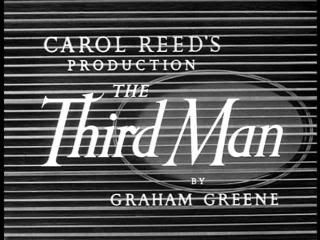
In Peter Bogdanovich's introduction to the Criterion DVD of Carol Reed's The Third Man, he relates a conversation with Orson Welles where Welles calls his role in the film the greatest "star part" ever written. What he meant was that the entire first half of the film is comprised of characters talking about Harry Lime, so when he finally appears the audience almost can't help but feel a certain sense of awe. However, while the build-up to his debut is sublime (thanks in great part to Graham Greene's tension mounting script), it's Welles presence and charisma which finally makes the final quarter of the film work. Harry Lime is an amazingly complicated creature, morally reprehensible but appealingly free and relaxed about his place in the world. A lesser actor could be swallowed up by such an ambiguous part.
Much has been written about The Third Man, but what really struck me as a viewer was how everyone involved seemed to be working just a little bit harder to make something special. From Reed's direction, to the actors (who are uniformly excellent), to the unforgettable music, this is one of those rare instances in film where all of these wonderful separate elements create a cohesive whole.
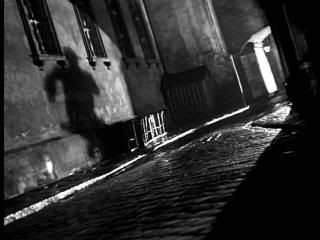
Joseph Cotton stars as Holly Martins, a hack writer who finds himself alone in post-World War II Vienna when he arrives to find his friend Lime (who had promised him a job) dead. Running afoul of the local law enforcement (who believe Lime to be mixed up in any number of criminal deeds), Martins decides to find out the truth about Harry's death, finding a barely willing partner in Anna (Alida Valli), Lime's girlfriend before his death. As Martins uncovers more about his friend's strange death he begins to question the image of his good-natured partner, and soon begins to wonder if Harry Lime is really dead at all.
Post war Vienna is almost a character in the film, the stone streets and cracked steps transporting Holly Martins into a very different world than he is used to, and far away from the caricatures that populate his pulp novels. Director Reed films the city as an expressionistic nightmare with a ghostly mix of light and shadow, where even a balloon salesman towers threateningly, and dutch angles create a sense of other-worldliness and psychological uneasiness.
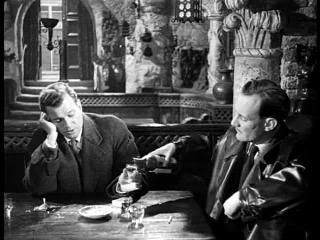
Cotton gives a typically strong performance in the lead. His Holly Martins is a boozing romantic, caught up in the black and white morality of his stories and faced with some rather severe touches of gray. Alida Valli is sedate and forlorn as the female lead, totally devoted to Lime even as Martins fruitlessly tries to gain her affection. Welles is as strong as expected, and Trevor Howard is tremendous as the cautiously sympathetic Major Calloway.
The fine folks at Criterion have once again gone above and beyond in presenting a film that has had a rather troubled history of release. We begin with an insightful introduction by director (and film historian) Peter Bogdanovich which gives a fine summary of some of the elements which have contributed to the film's reputation.
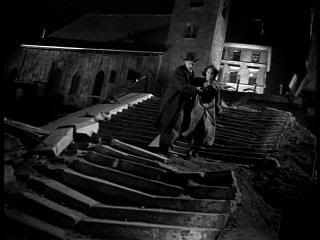
As expected, we are also treated to some in-depth supplements, starting with two radio pieces. After the success of The Third Man, there was a radio series demonstrating the early adventures of anti-hero Harry Lime. An episode of this series, written by Welles and called "A Ticket To Tangiers" is included here and shows a fascinating softening of the character we see in the film. Also included is a Lux Radio Theatre presentation of a dramatization of The Third Man which runs an hour and features Joseph Cotton, Evelyn Keyes, Ben Wright and Ted de Corsia in the lead roles.
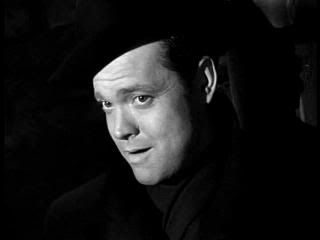
Finally, we have an astounding example of the restoration process for the film, as well as the usual Criterion color bars.
The film is presented in a 1.33:1 aspect ratio, and it's very likely it hasn't looked this good since its original release. The black & white image is sharp, and film damage is barely noticeable. Audio is Dolby Digital 2.0 mono, and is clear throughout. For those who have only seen the film in grainy television broadcasts, you are in for a definite treat.
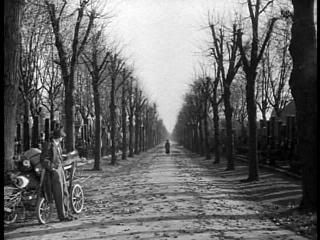
An amazing piece of cinema that resonates nearly 60 years later, The Third Man defies easy categorization. Stylish, but with a recognition of sadness and loss, it finds itself worthy of the lofty praise that has been heaped onto it and deserving of a spot in any film lover's collection.










No comments:
Post a Comment